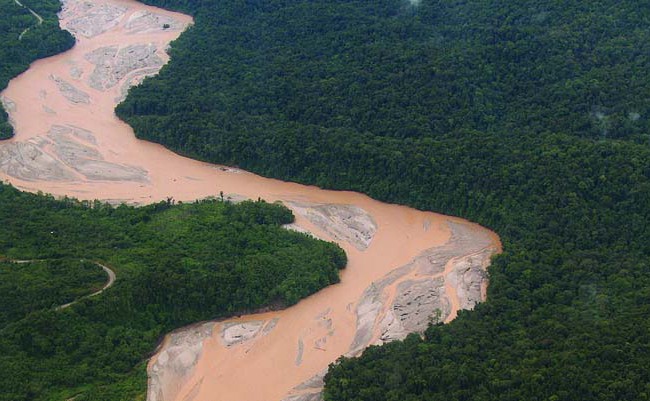
The politics of gifting
Changes to the Ok Tedi Mining Agreement by the Papua New Guinea parliament last week officially transferred full ownership of the copper-gold mine to the PNG government.
The PNG Sustainable Development Program (PNGSDP) was by design a trust fund endowed with shares totaling 63% of Ok Tedi Mining Limited (OTML). Since 2001 these shares had been held in trust for the chief benefactors – the landowners and people of PNG’s Western Province. But after parliament voted 62-0 to acquire the shares PNG Prime Minister Peter O’Neill maintained that BHP Billiton’s ongoing level of control within PNGSDP was inappropriate.
In 2001, the Ok Tedi ownership structure was established through an arrangement between BHP and prime minister Sir Mekere Morauta’s government – after the environmental disaster by the mining giant forced it to quit running the mine.
Closing the mine was not an option for the PNG government; the tax revenue from the mine was too great to ignore. But BHP was unwilling to transfer or ‘gift’ its remaining shares to the state, citing concerns relating to corruption and public sector incapacity. PNGSDP was therefore designed to manage Ok Tedi’s dividends in trust for the people of Western Province and to deliver nation wide development projects.
Last week the PNG Parliament effectively cancelled the shareholding of PNGSDP, the charitable entity set up to house BHP Billiton’s remaining share in OTML. After considerable environment damage was found to be caused to the Fly River ecosystem in 1990s the mining giant agreed to offset its share in the mine by establishing PNGSDP.
Recently Mr O’Neill said, ‘it is time to put the ownership of the mine, and its future, beyond doubt. The behind-the-scenes influence of BHP, and its representatives and appointees, has gone on for too long.’
Sir Mekere, currently chairman of PNGSDP and Ok Tedi Mining Ltd., insists Prime Minister Peter O’Neill is ‘stealing’ an $876 million asset, the Ok Tedi copper-gold mine. He says the ‘proposal to expropriate without payment the PNGSDP shareholding of 63.4 percent, which the company holds on behalf of Western Province is very destructive to the nation, to Western Province and to investor confidence.’
When an Australian Court originally awarded damages for claims by landowners against BHP, OTML, and the PNG government for damage to river ecosystems, the future impact of the courts verdict was far-reaching.
The option to settle out of court to stem the tide of potential claims against the parties in part informed the establishment of the Community Mine Continuation Agreement (CMCAs) under the Ok Tedi Ninth Supplemental Agreement Act 2001.
In 2010, PNG treasurer Peter O’Neill explained that the government’s position was not to takeover the stake in Ok Tedi previously owned by BHP. But he went on to criticise PNGSDP for underperforming on the development promises established under the 2001 trade-off between the Morauta government and BHP.
Additionally, last week’s legislative changes by the PNG parliament repealed laws that have in practice provided immunity from civil action against BHP Billiton for the significant impact of mine tailings on the river ecosystem of the Fly River.
The PNG Government takeover of Ok Tedi gives the government 100% ownership. Notwithstanding this, one analyst suggests that, for the moment at least, it seems PNGSDP will remain an ongoing entity with about US$1.4billion held in its long-term fund in Singapore.
In a recent EMTV interview though, Prime Minister O’Neill said ‘PNGSDP should be stopped and reassessed because it has not used its funds to really capture the needs of the people of Western Province.’
Right now it is not clear if the government will move to take over management of PNGSDP as well and, if so, what the timing and mode might be.
Ironically, all this is happening at a time when Ok Tedi’s operations and profits are likely to diminish. Mine closure was meant to take place in 2013 but under a mine life extension plan it could go on at least until 2025.
The mine life extension has been costed at USD 850 million. With it, copper and gold production will be reduced by about 40%. The new compensation agreement negotiated with Fly River villages reflects this: their compensation package has been reduced. Profits will never again reach the heights of 2008-9 because of the smaller scale, and for current the fall in the price of copper and gold.
As to the politics Mr O’Neill announced on national radio in Port Moresby that an amicable solution was agreed to twice between he and Sir Mekere. But O’Neill says on that both occasions Sir Mekere had reneged.
Sir Mekere countered by stating that Mr O’Neill is behaving in a self-interested manner by taking over the assets of the people of the Western Province without consultation.
Former mining minister & ousted Bougainville MP Sam Akotai says what the PNG government is attempting is criminal, and that the history of the environmental damage is not entirely the fault of the developer, BHP Billiton. The PNG government, he said, has always benefited from the revenue source provided by the copper and gold mine. Mr Akotai is fearful of what the takeover will signal to existing and future foreign investors.
The nature of the legislation that goes through parliament in Waigani should be watched closely.
Speculation is growing over the timing the takeover. Pundits have questioned Sir Mekere’s silence on the recent entry ban imposed on Dr Ross Garnaut, PNGSDP’s former Chairman by Mr O’Neill’s administration.
Political wrangling over vested interests hindered open discussion on the nature of the Ok Tedi takeover, and the airing of dirty washing reduces the prospect of a workable solution, so close to the November 2013 PNG Annual Budget.
